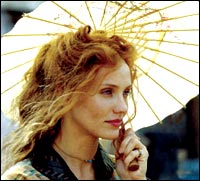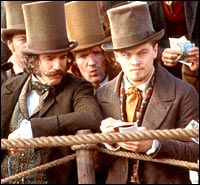
|
A Martin Scorsese film. But...
Gangs of New York has a storyline that just won't give up
|
Prem Panicker
The silence of the dark theatre is broken by a harsh, rasping sound --- the kind that puts your nerves on edge.
The darkness on screen dissolves, resolves into the close up of a face (Liam Neeson) running a cut-throat razor over the stubble on his cheek. The sound intensifies into the cruel sizzle of knife cutting skin. Neeson hands the blood-stained razor to his young son and, even as the latter moves to wipe it off, the father admonishes: 'The blood stays on the blade.'
The scene is a prelude to the film's defining moment. The New York of the 1840s is not so much a city as the canvas for a brutal struggle between the Nativists, who call America home and who resent the presence of outsiders on their turf; and the immigrants, mostly Irish, led by Priest Valon and his Dead Rabbits gang.
The battle ends when the Butcher kills Valon as the latter's son looks on, ending not just the life of the leader of the Irish, but any semblance of resistance to his hegemony.
The story fast forwards 16 years to the point when the son, now a grown up Amsterdam Valon (Leonardo DiCaprio, aiming for street gravitas via a wannabe Van Dyke) walks out of a reformatory school and into the Five Points.
From there on, the story assumes a complex, at times convoluted, matrix that incorporates a doomed father-son relationship between the Butcher and the boy whose father he killed and whose death anniversary he still celebrates as his greatest triumph; a foray into forbidden pleasures in the person of pickpocket Jenny Everdeane (Cameron Diaz), whose sensuality is first captive to the Butcher, then to the lad he looks on as his son; a side excursion into the complex, mutually parasitical, relationships between gangsters and of politicians as exemplified by Boss Tweed (Jim Broadbent) and, finally, an examination of the immediate aftermath of Abraham Lincoln's proclamation of the abolition of slavery, the civil war that followed, and the draft riots of 1863, in which desperate citizens finally take up arms against an uncaring authority that asks them to die for a cause they do not espouse.
That is a whole lot of threads to weave a tapestry with.
At its heart, however, the film is about revenge as redemption. Irrespective of the number of cul de sacs the story takes you down, it always brings you back to the leitmotif. The film can end only when the circle of death is complete, and the young boy who saw his father slain before his eyes can see his father's killer die at his hands.
The film has enough high points to prompt the Oscar committee sharpening their pencils and taking notes on who they want to give those coveted statuettes to. The background itself is a masterpiece of set design, within the confines of Rome's famous Cinecitta Studios, Dante Ferretti creates a pulsing, throbbing maze of underground tunnels and riotous interiors that form the backdrop for an anarchistic mass of warring mobs, battling for the right to exploit a sub-section of humanity at its most degraded.
 Miramax reportedly spent $97 million --- its biggest budget, ever --- on this film, and it shows. What is more, the director and cinematographer make sure they give you the guided tour. Sandwiched in-between the story-developing sequences are long forays through the rabbit-warren, with the camera focusing on some sidelight that is seemingly irrelevant, yet in the overall analysis enhances the feel of 'being there'.
Miramax reportedly spent $97 million --- its biggest budget, ever --- on this film, and it shows. What is more, the director and cinematographer make sure they give you the guided tour. Sandwiched in-between the story-developing sequences are long forays through the rabbit-warren, with the camera focusing on some sidelight that is seemingly irrelevant, yet in the overall analysis enhances the feel of 'being there'.
And then there is Daniel Day-Lewis, returning to the screen after a five-year absence to turn in a chiaroscuro performance that has Best Actor (Or is it Best Supporting Actor? It would be a travesty if that happens, because Day-Lewis, not DiCaprio, is the fulcrum around which this film revolves) written all over it.
His Bill the Butcher is a narcissistic performance --- part camp, part berserker, wholly believable. He slaughters men and cattle with equal facility, he creates hell on earth, then sets himself up to rule over it.
DiCaprio does well as Amsterdam Valon, as well, that is, as a somewhat one-dimensional character allows him to. Diaz is there merely to counterpoint the two male leads and to serve as catalyst for the escalation of tension; she is an accomplished enough actress to do the job that needs doing.
Broadbent is fittingly over the top in an over the top role, and Brendon Gleeson as Monk McGinn gets to steal a few frames. Henry Thomas as Amsterdam's childhood friend has a role with flesh in it, and he chews off a good, man-sized bite.
The cinematography (Michael Ballhaus) earns bragging rights and will battle with Conrad Hall's work on Road To Perdition for Academy honors; Ballhaus's craft teams with Martin Scorsese's craftsmanship to produce several gorgeous set-pieces, my special favourite being one long, uninterrupted shot of Irish immigrants stepping off a ship, going through the rudimentary immigration formalities of the time ('Sign that paper, that means you are an American citizen; sign this one, it means you have the right to fight for your country'), and passing straight through to the boarding ramp of a troop ship waiting to take them off to war, while from its other end, the ship is offloading dozens of coffins containing those who have gone before.
The film has sweep, it has scope, it is gigantic in concept and extravagant in execution. But.
The story of how Martin Scorsese decided, way back in 1977, to make this film based on the book by Herbert Asbury, and of his 25-year fight to make that dream come true, is already the stuff of movie-making legend, hence merits no reiteration.
But could it be that when you dream of something for so long, when you want something so desperately, and you finally get it, you tend to lose --- by just a fraction, perhaps --- your inner sense of balance? Do all those years of longing, dreaming and planning prompt you into doing a little bit too much?
 That, at least, is the impression I came away with. If this film has a problem, it lies in a storyline that just won't give up. Premier scriptwriters Jay Cocks (whose previous works include The Age Of Innocence, and who is also credited with the story), Stephen Zaillian (Searching For Bobby Fischer, A Civil Action, Hannibal) and Kenneth Lonergan (The Adventures of Rocky and Bullwinkle) appear to be so intent on packing in everything that, in the process, they sacrifice exposition of both central plot and character.
That, at least, is the impression I came away with. If this film has a problem, it lies in a storyline that just won't give up. Premier scriptwriters Jay Cocks (whose previous works include The Age Of Innocence, and who is also credited with the story), Stephen Zaillian (Searching For Bobby Fischer, A Civil Action, Hannibal) and Kenneth Lonergan (The Adventures of Rocky and Bullwinkle) appear to be so intent on packing in everything that, in the process, they sacrifice exposition of both central plot and character.
The Asbury book is a sprawling, sweeping epic, filled with innumerable plots and subplots. Somewhere along the way, the script of the film loses itself in that maze.
The core of the film lies in the fact that Priest Valon makes a bid to unite the Irish immigrants and lead them in a fight for their rights. He fails. 16 years later, it is the sons turn to try.
For the audience to buy into it, the film had to show why the son succeeded, where the father failed. Amsterdam Valon paves the way for that success when he tells his cronies, 'There are 15,000 Irish coming off the boats every week --- if we can bring them together, we ain't got a gang, we got an army.'
Indeed. But then, just when you think the story shifts to the docks, to a concerted effort to meld those new-minted immigrants into a titanic force, it shoots off at a tangent.
And where this hurts the most is in the denouement. It is like if you were watching the Iliad on screen, you live through the abduction of Helen, you settle down to enjoy the story of an immense struggle between two gigantic forces. Instead, the storyteller starts in on the political structure of Agamemnon's Greece.
And then cuts rapidly back to the plains outside Troy, where the irresistible force that is Achilles steps out to battle the immovable force that is Hector only for Hector, the silly twit, to slip on a banana peel and break his stupid neck.
You wouldn't buy into the Iliad if it was like that, would you?
Among film editors, Thelma Schoonmaker --- Casino, Good Fellas and Raging Bull with Scorsese, plus The Age Of Innocence, Cape Fear, Last Temptation Of Christ et al --- is considered legendary. Asking if her scissors slipped is, thus, tantamount to sacrilege. Yet, did it?
Did the Scorsese-Schoonmaker team spend a little too much time on what in context of the main story are side issues, leaving them with that much less of film time to devote to developing the rivalry that is at the film's core?
Scorsese evidently poured his heart and soul into the project that he nurtured as a dream for 25 years. But somehow, you wish at the end of the film that its heart shone through as clearly as its director's.
Tell us what you think of this review